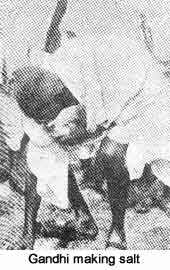|

|
Ancient
Medieval
Modern
Chronology
|

|
| |
Dandi march was a walk undertaken by the Indian nationalist leader Mohandas Gandhi and his followers in 1930. On March 12, Gandhi and 78 followers began the 24 day march from Sabarmati Ashram, near Ahmadabad, through the Gujarat villages to the sea at Dandi, about 380 kilometres away.  There Gandhi committed a deliberate act of civil disobedience against British rule by ceremonially breaking the law and making salt. There Gandhi committed a deliberate act of civil disobedience against British rule by ceremonially breaking the law and making salt.
At that time it was against the law to possess salt not made and taxed by the government. The British authorities did not arrest Gandhi immediately but imprisoned him about a month later on May 5. The Dandi march aroused enormous public interest and more than 60,000 people followed Gandhi's example during 1930 by making salt and going to prison.
next page >>
|




 There Gandhi committed a deliberate act of civil disobedience against British rule by ceremonially breaking the law and making salt.
There Gandhi committed a deliberate act of civil disobedience against British rule by ceremonially breaking the law and making salt.